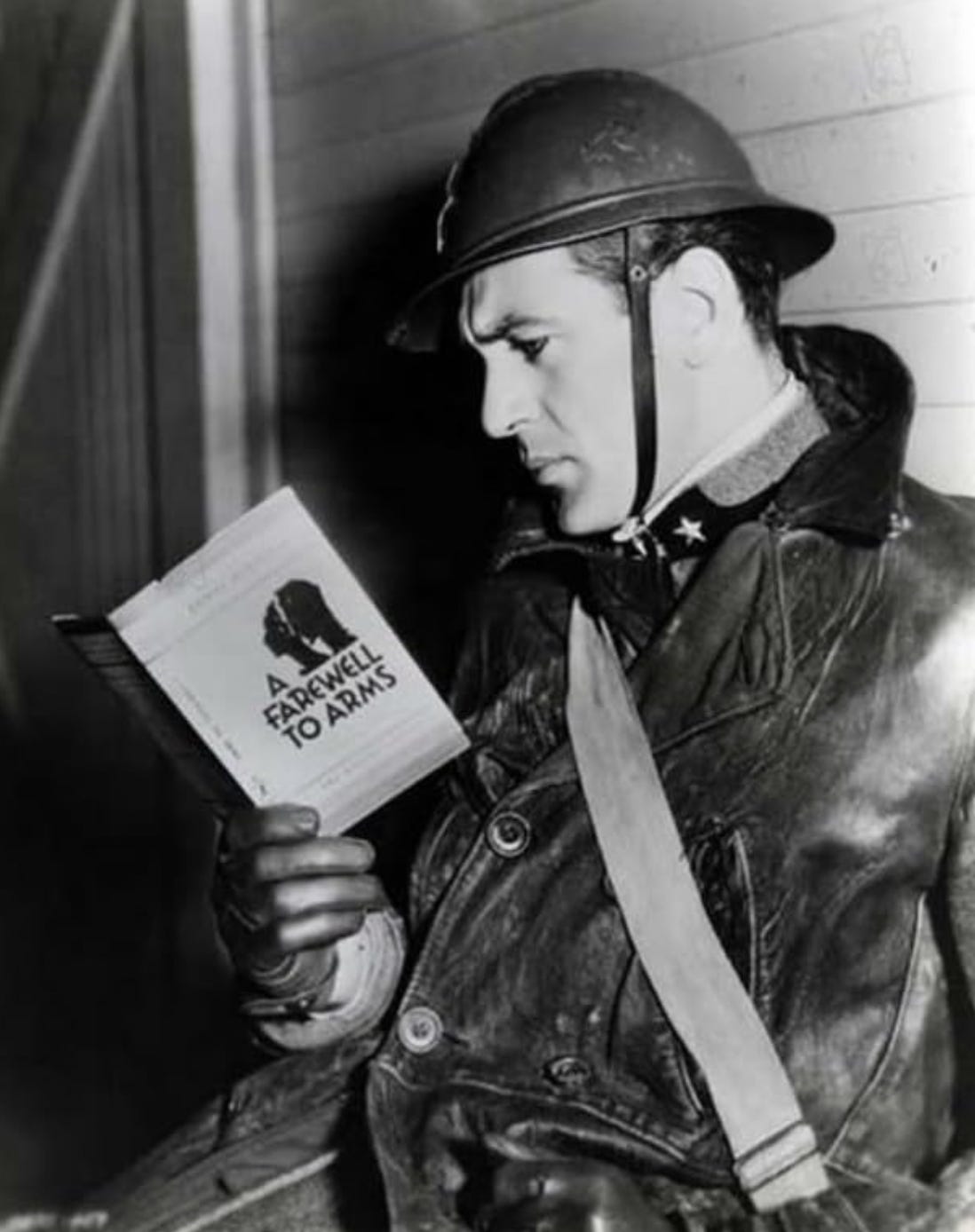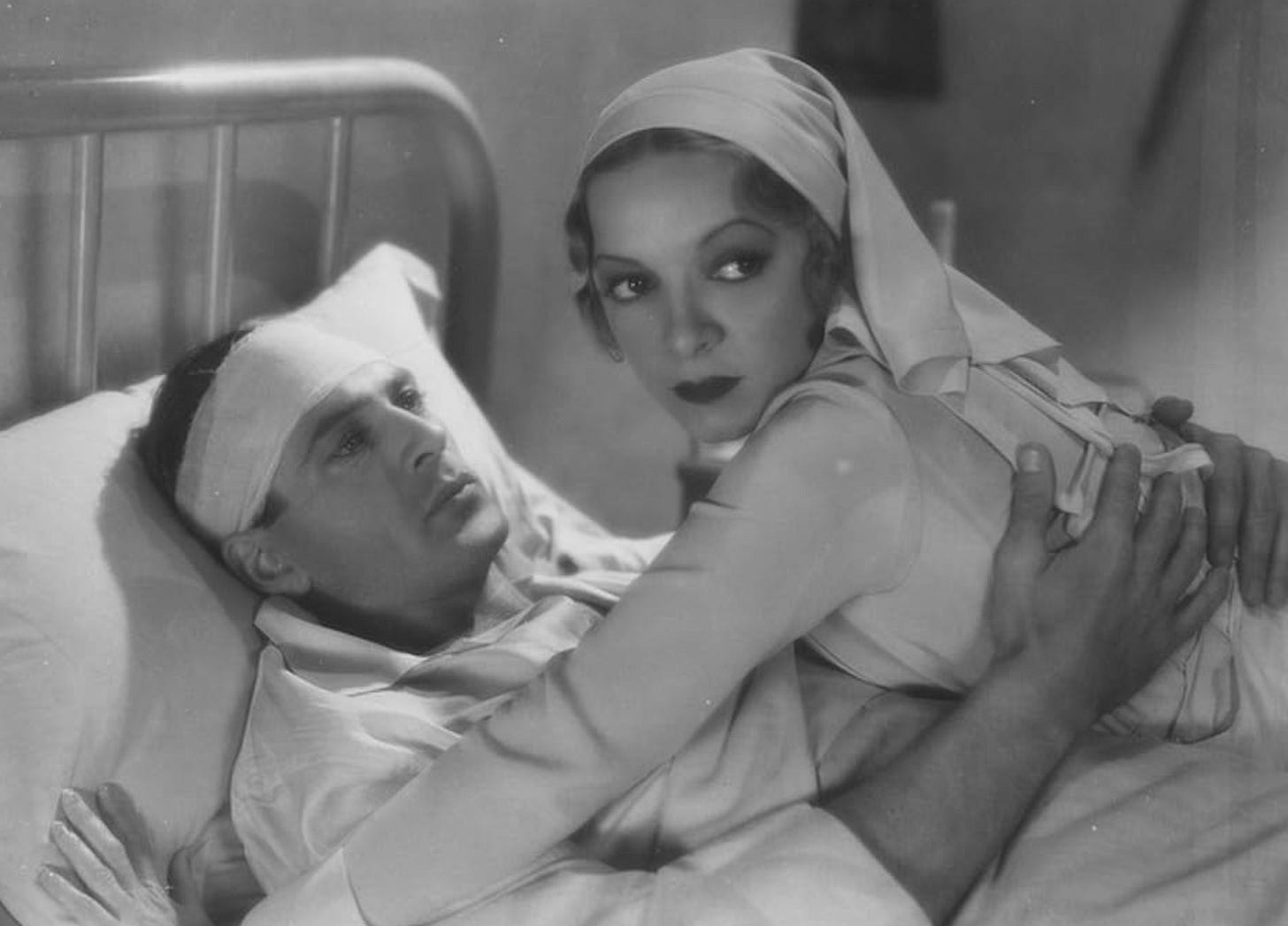There’s a war on. And tonight, who cares? And tomorrow, who knows?
A Farewell to Arms (1932) - watched 9/26/24
Director: Frank Borzage
Writers: Benjamin Glazer & Oliver H.P. Garrett
Starring: Helen Hayes, Gary Cooper, Adolphe Menjou, Mary Philips
Available to watch on Tubi, Sling TV, The Roku Channel, Crackle, Amazon Prime Video, Plex
First Time Watch? Yes
Considering the shockingly low number of Best Picture nominees that have impressed me so far, I wasn’t looking forward to watching A Farewell to Arms. A war drama? Adapted from an Ernest Hemingway novel? This is so completely not my cup of tea that I halfway considered nudging this one under the rug and pretending it didn’t exist, and hoping none of my readers would notice I skipped a film.
But I persevered! For you, reader!! Luckily, this WWI drama/romance is just shy of 80 minutes long, so it wasn’t too much of a sacrifice to my sanity and free time. And hey, it mostly ended up being somewhat worth it in the end.
I must admit that I do have a pretty big blind spot when it comes to classic American authors and their works. I somehow only managed to read one Hemingway novel in my entire life, The Sun Also Rises, and I hated it so much that I never gave him another shot. I can be pretty stubborn that way with the art and media that I consume—once I decide I don’t like something, I tend not to waste my time on trying to like it, or seeking out that person’s other works.
So I’m probably not the best authority on how A Farewell to Arms, the movie, compares to the book. I did enjoy the movie, at least more than I thought I would, and Hemingway apparently hated the adaptation of his semi-autobiographical novel, believing it to focus too much on the romance. Honestly, Hemingway seemed like kind of a pain in the ass to me, so knowing that he hated this adaptation has me firmly in the Team Borzage, Team Lighten-Up-Ernest camp. After all, how can anyone watch a sweet, heartfelt love story unfold and decide to be miserable about it? What’s so bad about a little romance?
We blame everything on the war, but that’s rot. It’s something in ourselves.
Frederic (Gary Cooper) is a lieutenant serving in the Italian army during World War I. He spends a lot of time fucking around with his pal, Captain Rinaldi (Adolphe Menjou), who often calls Frederic “baby.” I wish more guy friends would do this. Anyway, during one such fuck-around, he meets Catherine (Helen Hayes), an English nurse whose fiancé was killed in the war. Frederic is drunk when they first meet, and leaves a less-than-desirable first impression on Catherine, but after a period of being uncomfortably persistent, Frederic and Catherine make out and have sex and fall in love, because that’s how fast these things go in the 1930s, apparently.
Frederic receives orders to the front, and he promises Catherine he will come back to her. Rinaldi, who fears Frederic has gotten too attached to Catherine too quickly, has Catherine transferred to a hospital in Milan. They aren’t separated for long, though—Frederic is injured on the front and is sent to the hospital in Milan to recuperate, where Catherine rushes to his side. They have a quickie wedding in Frederic’s hospital room, after which Catherine’s friend, Fergie (Mary Philips), who is a huge hater by the way, warns Frederic that he’d better not get Catherine pregnant.
Well, guess what.
Frederic’s leave comes to an end and he is sent back to the front. After he leaves, Catherine confides in Fergie that she’s pregnant, and books a train to Switzerland. While living in Switzerland, Catherine and Frederic write letters to each other, but she never discloses in her letters that she is pregnant. Rinaldi, who is also a huge hater, intercepts Catherine’s letters and ensures they are never delivered to Frederic—he has them sent back to her.
Likewise, since Catherine no longer works at the hospital in Milan, they have Frederic’s letters sent back as well. Eventually, Frederic deserts and travels back to Milan to find Catherine. He does end up finding Fergie, who refuses to tell him Catherine’s whereabouts but does tell him that Catherine is pregnant. Rinaldi, feeling guilty and finally getting some damn sense, he tells Frederic where Catherine is staying in Brissago.
In Brissago, Catherine finds out that all of her letters have been sent back to her, never read by Frederic. She collapses, and has an emergency C-section, after which she finds out the baby is stillborn. Catherine comes to, and Frederic is by her side. She’s close to death and afraid, but Frederic assures her that they will never be apart again. Outside her hospital window, the war has ended and celebrations are beginning. Frederic takes Catherine into his arms and she dies as the new day begins.
But what is death to a Christian?

I gotta say, as much as I did end up enjoying this movie, it took me a while to become invested in Frederic and Catherine’s relationship. In these early days of cinema, we often saw romances blossoming after mere hours of the two leads meeting each other. They’re love bombing left and right, these weirdos! Did this actually happen a lot in the 1930s? In real life? A fella would meet a dame and that same night they’d profess their love for each other? Was it that they were so painfully horny that they needed to fall in love and get married before they burst? It’s puzzling! It takes me out of the narrative. I need to be invested in the characters on their own before I can accept them as a unit.
So initially, I was kind of on BFF/hater Fergie’s side! Frederic would absolutely seem fishy to me, and if Catherine were my friend, I would have told her to run for the hills. Frederic was by all accounts the 1930s version of a fuckboy, carousing around Italy playing with ladies’ feet with his buddy Rinaldi. Now his drunk ass has his sights set on my sweet virginal friend? Get real!
But it quickly became clear that Frederic and Catherine would not be deterred. Sure, fine. I still wasn’t totally buying it, right up until the final scene, with Catherine on her death bed and Frederic by her side, telling her that they would never really be apart. While it didn’t make me cry (a very important metric I’ve now decided to use), I was moved by the dialogue in this scene, and the heartbreaking yet hopeful way it was delivered by Gary Cooper and Helen Hayes.

This is maybe the rare movie where it could have benefitted from having a longer runtime. We only spend an hour and twenty-ish minutes with Frederic and Catherine, and during a good chunk of that time, they’re separated. I grew to like these characters a lot, individually, but it was difficult for me to connect with them together, as a couple, as the soulmates that they seem to believe they are. Were it not for the impact of that final scene, I would have found this movie completely unfathomable and pointless.
There was an alternate ending that was apparently made available for some theaters—those theaters had the option to show either the original ending, or the alternate, happier one. I haven’t looked into whether or not that alternate ending is somewhere out there, available to watch, but I also kind of don’t want to. I can’t imagine an ending better than this one, honestly—the juxtaposition of the world celebrating the war’s end outside, with the somber devastation of Catherine’s death in her hospital room, is so poignantly beautiful, such a gut punch, that I can’t imagine any other ending possibly working for this story.
Hemingway himself was apparently incensed at the idea of the film having an alternate ending, and he used his influence in larger cities to get theaters to play the original. This is maybe the only time in which I will concede that Hemingway maybe, kind of, in this one specific instance, rocked.
In life and in death, we’ll never be parted. — You do believe that, don’t you, Cat? — I do believe it. And I’m not afraid.
Quick Facts:
Nominated for 4 Academy Awards, won 2
Best Picture
Best Art Direction (Hans Dreier and Roland Anderson)
Best Cinematography (Charles Lang, won)
Best Sound Recording (Franklin Hansen, won)
Tied with Cavalcade and Lady for a Day for most nominations this year
The only Best Picture nominee this year to be also nominated for Best Cinematography (which it won).
The first Hemingway novel to be adapted into a film
Stray Notes:
I feel like this could be… boring. Hemingway is usually kind of boring to me, sorry!
This might just be the DVD I’m watching, but this feels so low quality compared to other movies at the time.
It’s so quiet!
How much does Tarantino love this movie I wonder (front-loaded with foot stuff)
Gary Cooper & Helen Hayes have nice chemistry.
Lovebombing much??
“I was blown up… eating cheese.” Brother we’ve all been there.
First person POV shot is really interesting.
Are these two people so horny that they’re about to ruin their lives??
Maybe not!
Wait yes! Yes they are!
The time jump was cute but doesn’t quite match the mood/tone of the film?
A bit slow… not much happening. But it’s still somehow more interesting/engaging than I thought it would be. I’m crediting the performances for that.
Battle scenes are super dark—show me wtf is going on!!
Well damn! Sad!
This man saw a woman with big natties and assumed she had kids?? SIR??? A mess!
Oh!! So sad!
Okay this ending—wow! It got me. It got me good! Saved the movie from a lower rating tbh!
My Rating: ⭐️⭐️⭐
Next Up: I Am a Fugitive from a Chain Gang (1932)








